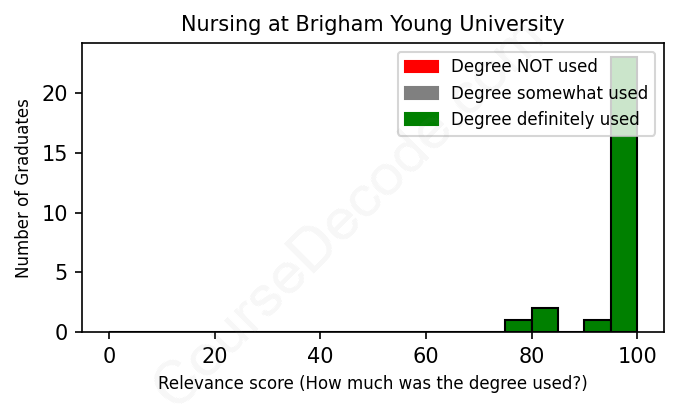
First, some facts. Of the Nursing graduates from Brigham Young University we've analyzed , here's how many have used (or NOT used) their degree in their career:

These are estimates based on AI analysis of 27 LinkedIn profiles (see below).
The verdict? Great! Overall, with an average relevance score of 97%, Nursing graduates from Brigham Young University have a substantially higher likelihood (+30%) of finding work in this field compared to the average graduate across all fields:
And for comparison, here's the chart for all profiles we've looked at across all degrees.
Also, after graduating, only 25% of these graduates have pursued further education other than another Bachelor's degree (such as a Masters degree or other), compared to the average across all profiles of 35%. This suggests a Bachelors degree is enough for most Nursing graduates, and it's normal to look for work straight after graduation.
See the details:
|
Relevance score: 100% We think this person has gone into a career highly relevant to their degree. We think this person has gone into a career highly relevant to their degree.
DEGREE INFOGraduated in 2010 from Brigham Young University with a Bachelor of Science (BS) in Nursing. No other secondary education since. JOB HISTORY SINCE GRADUATIONRegistered Nurse Intermountain Healthcare Jun 2010 - Present ABOUTNo information provided. |
The top 10 most common jobs done by the graduates we've analyzed (ranked most common to least) are:
From analyzing the job paths of graduates from Brigham Young University with a degree in Nursing, it's super clear that a majority of these individuals have ended up in roles that are directly related to nursing. The most common jobs include Registered Nurse (RN) positions across various healthcare settings, like hospitals, emergency rooms, and clinics. Many graduates have held multiple RN roles, particularly at Intermountain Healthcare, which seems to be a popular employer. Other positions such as Family Nurse Practitioners and specialized roles like Neonatal Intensive Care Nurse also show up frequently, indicating that many graduates choose to further their education and clinical expertise.
Overall, the jobs these graduates have taken are generally very relevant to their nursing education. Most positions, like those of Registered Nurses and Family Nurse Practitioners, require the specific skills and knowledge they learned during their Bachelor’s program. However, a few roles, such as some positions in home health or as a nurse educator, are either indirectly related or don’t fully utilize the advanced skills associated with a Bachelor's in Nursing. But even so, most graduates are staying true to their nursing roots, using their education to make a real difference in patient care!
Here is a visual representation of the most common words in job titles for Nursing graduates (this is across all Nursing graduates we've analyzed, not just those who went to Brigham Young University):

When looking at the career trajectories of nursing graduates from Brigham Young University, it's clear that most individuals start their professional journeys in roles very much related to nursing. The majority of graduates land their first jobs as Registered Nurses at reputable healthcare institutions, particularly Intermountain Healthcare, which seems to be a common stepping stone for many. For those who graduated in the early 2010s, positions span a variety of specialties such as labor and delivery, emergency care, and pediatric nursing. This initial focus on core nursing roles is a solid start, laying the groundwork for future growth and specialty advancement.
Five to ten years down the road, many graduates continue to build on their nursing careers, often taking on more advanced roles such as Nurse Practitioners or Clinical Directors. Some have even ventured into roles that incorporate leadership, education, or specialized care. However, it’s worth mentioning that while the overwhelming majority are thriving in nursing-related positions, there are a few outliers who may have transitioned into unrelated fields or entrepreneurial ventures. Overall, though, the trajectory for BYU nursing graduates looks promising and centered around solid, relevant careers in healthcare.
Honestly, a Bachelor’s degree in Nursing is generally no walk in the park, and that holds true for Brigham Young University as well. You’re looking at a rigorous curriculum that includes heavy coursework in subjects like anatomy, physiology, and pharmacology, along with hands-on clinical experiences. Nursing programs can be pretty demanding, often requiring a lot of juggling—between lectures, labs, and those long shifts in clinical settings. It’s definitely a challenge, but many students find it super rewarding. If you're passionate about healthcare and ready to put in the work, you'll find it’s tough but totally doable!
Most commonly, in the LinkedIn profiles we've looked at, it takes people 4 years to finish a Bachelor degree in Nursing.
So, looking at these nursing grads from BYU, it seems like they’re doing pretty well financially, especially considering they all have solid nursing backgrounds. Most of them kicked off their careers in positions that pay reasonably well, like registered nurses at reputable hospitals (Intermountain Healthcare seems to be a popular choice). While starting salaries can vary, experienced RNs often bring in a decent paycheck, and many went on to higher roles, like family nurse practitioners, which typically pay even more. Plus, a few even ventured into co-founding health tech companies or became nurse educators, which can be lucrative too. Overall, I'd say these guys are likely making good money and have a stable career path ahead of them!
Here is a visual representation of the most common words seen in the "about" section of LinkedIn profiles who have a Bachelor degree in Nursing (this is across all Nursing graduates we've analyzed, not just those who went to Brigham Young University). This may or may not be useful:

Here are all colleges offering a Bachelor degree in Nursing (ordered by the average relevance score of their Nursing graduates, best to worst) where we have analyzed at least 10 of their graduates: